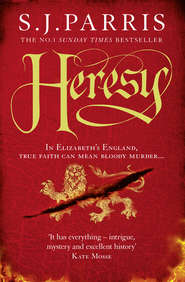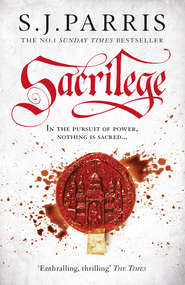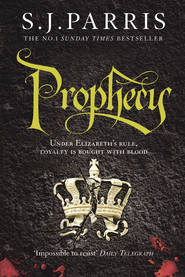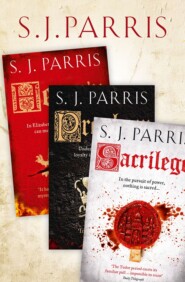По всем вопросам обращайтесь на: info@litportal.ru
(©) 2003-2024.
✖
Treachery
Автор
Год написания книги
2019
Настройки чтения
Размер шрифта
Высота строк
Поля
‘Not formally, though he is learned in matters that concern the sea, naturally,’ Knollys says. ‘But in his cabin he keeps an English Bible and a copy of Foxe’s Book of Martyrs, as well as the writings of Magellan and French and Spanish volumes on the art of navigation. He is excessively fond of music and makes sure he has men aboard who can play with some skill. Why do you ask?’
‘Only that he is Europe’s most famous mariner,’ I say. ‘I am intrigued to meet him – he has changed our understanding of the world. I imagine he must be a man of extraordinary qualities.’
Knollys nods, smiling. ‘You will not be disappointed. Now, the two of you can watch the sights while I go about my business. God willing we shall have calm seas and a good wind and we will be in Plymouth inside two days.’
He waves us vaguely towards the front of the ship. I follow Sidney up a few almost vertical stairs to the high deck. As soon as Knollys has turned his back, Sidney disregards his command; he greets the nearest sailor heartily and presses him with questions about his business – why does he tie that rope so, what does it signify that the topsails are still furled, what is the hierarchy of men in the crew, where is the farthest he himself has been from England – barely pausing to draw breath, until the poor fellow looks about wildly for someone to save him from this interrogation.
Smiling, I leave them to it and find myself a quiet spot at the very prow. I do, as it happens, know one end of a ship from the other – I spent part of my youth around the Bay of Naples – but I reason that the more useless I make myself appear, the more I will be left to my own devices. What does pique my interest here is the art of navigation; I should like to have the opportunity to talk to Knollys about his charts and instruments, if he would allow. Since sailors for centuries have calculated their position by the stars with ever more precise calibrations, and since for those same centuries all our charts of the heavens have been based on erroneous beliefs about the movement of the stars and planets in their spheres, I am curious to know how navigators and cartographers will adapt to the new configuration of the universe, now that we know the Sun and not the Earth lies at its centre, and that the fixed stars are no such thing, their sphere no longer the outer limit of the cosmos. I wonder if these are ideas I could discuss with an experienced sailor like Knollys. He circumnavigated the globe with Drake in 1577, according to Sidney, on the voyage that made them famous and wealthy men; surely in the course of such a journey the calculations they made must have added up to confirmation that the Earth turns about the Sun and not the reverse? Drake and the men who sailed with him are forbidden by the Queen from publishing accounts or maps of their route, for fear they would fall into the hands of the Spanish, but perhaps Knollys might be persuaded at least to discuss the scientific discoveries of his travels with me in confidence, as one man of learning to another.
Ahead the Thames gleams like beaten metal as clouds scud across the face of the sun and their shadows follow over the water; in this light, you could almost forget it is a soup of human filth. I rest my forearms on the wooden guardrail and look down. I must check myself; with my state so precarious, it behoves me to be wary of what I say in public, until I know how it may be received. Knollys is, by all accounts, a good Protestant, like his brother-in-law Leicester and Sidney, but I would be a fool to imagine that these ideas of the Pole Copernicus have been accepted by more than a very few. Only two years ago I was openly ridiculed at the University of Oxford for expressing such a view in a public debate. Just because the Inquisition cannot reach me in Elizabeth’s territories, it does not follow that all Englishmen are enlightened.
We make steady progress along the river as it widens towards the estuary, here and there passing clusters of dwellings little more than shacks, where fishing boats bob alongside makeshift jetties. To either side the land is flat and marshy, pocked with pools reflecting the pale expanse of the sky. London gives you a sense of being hemmed in, pressed on all sides; there the sky is a dirty ribbon glimpsed if you crane your neck between the eaves of tall houses that lean in towards one another across narrow alleys, blocking the light. As we move further from the city, I feel my shoulders relax; the air freshens and begins to carry a tang of salt, and I inhale deeply, relishing this new sense of space. The sounds grow familiar: the snap of sailcloth, the creaks and groans of moving timber, the rhythmic breaking of waves against the hull as we rise and fall, the endless skwah-skwah of the gulls.
After supper, while Sidney settles to cards with Knollys and his gentlemen officers, I excuse myself and return to the deck. The wind is keener now and I have to wrap my cloak close around me against the cold, but I had rather be here in the salt air than confined in the captain’s cabin, with its fug of tobacco smoke and sweet wine. Directly ahead, the sun has almost sunk into the water, leaving the sky streaked orange and pink in its wake. To our right, or what Sidney insists I call starboard, the English coast is a dark smudge. To the left, on the other side of the endlessly shifting water, lies France, and I narrow my eyes towards the distant clouds as if I could see it.
The boards creak behind me and Sidney appears at my side, a clay pipe clamped between his teeth. He takes out a tinder-box from the pouch at his belt and battles for some moments to light it in the wind.
‘Thinking again, Bruno?’
‘It is a living, of sorts.’
He grunts, takes the pipe from his mouth, puffs out a cloud of smoke and stretches his arms wide, lifting his chest to the rising moon.
‘Nothing like fresh sea air.’
‘It was before you arrived.’
He leans with his back to the rail and grins. ‘Leave off, you sound like my wife. She always complains about the smell of a pipe. Especially now.’ He sighs and turns to face the sea again. ‘By God, it is a relief to be out of that house. Women are even more contrary than usual when they are with child. Why is one not warned of that in advance, I wonder?’
‘This time last year you were fretting you might not manage an heir at all. I’d have thought you’d be glad.’
‘It is all to please other people, Bruno. A man born to my station in life – certain things are expected of you. They are not necessarily your own choices.’
‘You don’t want to be a father?’
‘I would have liked to become a father once I was in a position to support sons and daughters myself, rather than still living in my father-in-law’s house. But … well.’ He laces his fingers together and cracks his knuckles. ‘They will not let me go to war until I have got an heir, in case I don’t come back. So I suppose I should be pleased.’
The sails billow and snap above us; the ship moves implacably forward, stately, unhurried. After a long silence, Sidney taps his pipe out on the rail in front of him.
‘I put a group of armed men and servants on the road to Plymouth two days ago. They will meet us there and escort Dom Antonio back to London.’
My earlier suspicions prickle again.
‘Along with us,’ I prompt.
Sidney turns to me with a triumphant smile, his eyes gleaming in the fading light. He grips my sleeve. ‘We are not going back to London, my friend. By the time Dom Antonio is warming his boots at Whitehall, you and I shall be halfway across the Atlantic.’
I stare at him for a long while, waiting – hoping – for some sign that this is another of his jokes. The wild light in his eyes suggests otherwise.
‘What, are we going to stow away? Hide among the baggage?’
‘I told you I had a plan for you, did I not?’ He leans back again, delighted with himself.
‘I thought it might be something realistic.’
‘Christ’s bones – don’t be such a naysayer, Bruno. Listen to me. What is the great problem that you and I share?’
‘The urge to write poetry, and a liking for difficult women.’
‘Other than those.’ He looks at me; I wait. ‘We lack independence, because we lack money.’
‘Ah. That.’
‘Exactly! And how do we solve it? We must be given money, or we must make it ourselves. And since I see no one inclined to give us any at present, what better way than to take it from the Spanish? To come home covered in glory, with a treasure of thousands in the hold – the look on her face then would be something to see, would it not?’
For a moment I think he means his wife, until I realise.
‘This is all to defy the Queen, then? For not sending you to the Low Countries? You plan to sail to the other side of the world without her permission?’
He does not answer immediately. Instead he looks out over the water, inhaling deeply.
‘Do you know how much Francis Drake brought home from his voyage around the world? No? Well, I shall tell you. Over half a million pounds of Spanish treasure. Ten thousand of that the Queen gave him for himself, more to be shared among his men. And that is only what he declared.’ He breaks off, shaking his head. ‘He has bought himself a manor house in Devon, a former abbey with all its land, and a coat of arms. The son of a yeoman farmer! And I cannot buy so much as a cottage for my family. My son will grow up knowing every mouthful he eats was provided by his grandfather, while his father sat by, dependent as a woman. How do you think that makes me feel?’
‘I understand you are frustrated, and angry with the Queen—’
‘The fellow she means to give the command of Flushing is my inferior in every degree. It is a public humiliation. I cannot walk through the galleries of Whitehall knowing the whole court is laughing at my expense. I am unmanned at every turn.’ The hand resting on the rail bunches into a fist.
‘So you must come home a conquering hero.’
‘What else is there for an Englishman to do but fight the Spanish?’ When he turns to me, I see he is white with anger. ‘It is no more than my duty, and she would prevent me for fear of letting her favourites out of her sight – she must keep us all clinging to her skirts, because she dreads to be alone. But I would be more than a pet to an ageing spinster, Bruno.’ He glances around quickly, to make sure this has not been overheard. ‘Picture it, will you – the thrill of bearding the King of Spain in his own territories, sailing back to England rich men. The Queen will not have gifts enough to express her thanks.’
I want to laugh, he is so earnest. Instead I rub the stubble on my chin, hand over my mouth, until I can speak with a straight face.
‘You really mean to do this? Sail with Drake to the Spanish Main? Does he even know?’
He shrugs, as if this were a minor detail. ‘I hinted at it numerous times as I was assisting him with the preparations this summer. I am not sure he took me seriously. But I can’t think he would object.’
‘He will, if he knows you travel without the Queen’s consent and against her wishes. He will not want to lose her favour.’ But I am not thinking of Drake’s advantage, only my own. The Queen will be livid with Sidney for flouting her command and if I am party to his enterprise, I will share her displeasure. Sidney will bounce back, because he is who he is, but my standing with her, such as it is, may never recover. And that is the best outcome; that is assuming we return at all.
‘Francis Drake would not be in a position to undertake this venture if it were not for me,’ Sidney says, his voice low and urgent. ‘Half the ships in his fleet and a good deal of the funds raised come from private investors I brought to him, gentlemen I persuaded to help finance the voyage.’ He jabs himself in the chest with his thumb to make the point. ‘He can hardly turn me away at the quayside.’
I shake my head and look away, over the waves. He is overstating his part in the venture, I am sure, but there is no reasoning with him when he is set on a course. If he will not brook objection from the Queen of England, he will certainly hear none from me.
‘I have no military experience, Philip, I am not a fighter. This is not for me.’
He snorts. ‘How can you even say so? I have seen you fight, Bruno, and take on men twice your size. For a philosopher, you can be very daunting.’ He flashes a sudden grin and I am relieved; I fear we are on the verge of a rift.
‘I can acquit myself in a tavern brawl, if I have to. That is not quite the same as boarding a ship or capturing a port. What use would I be at sea?’











